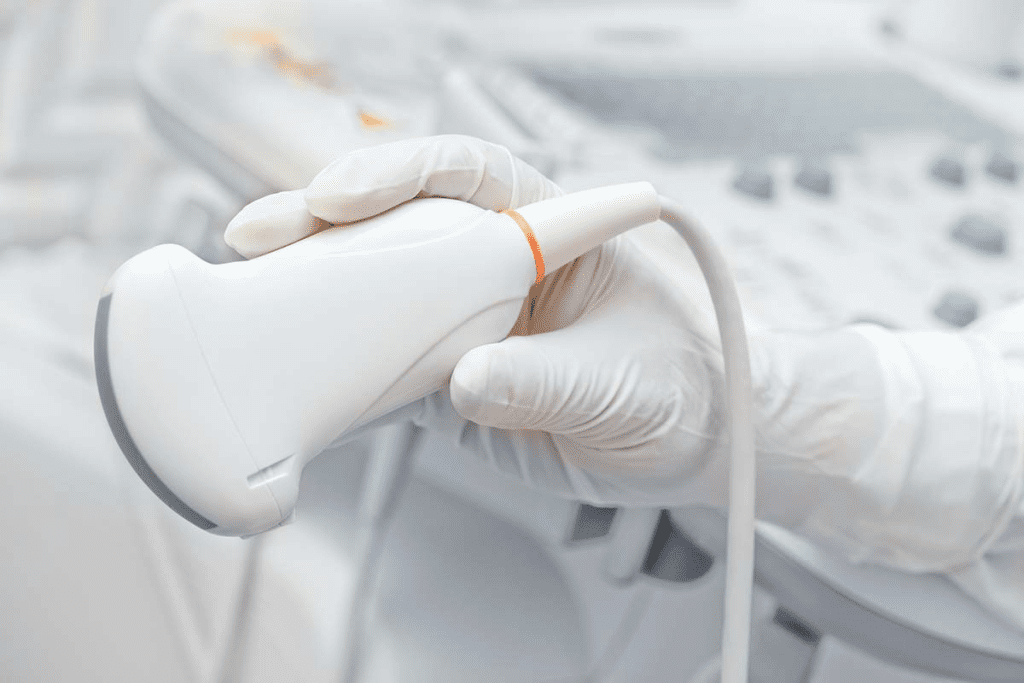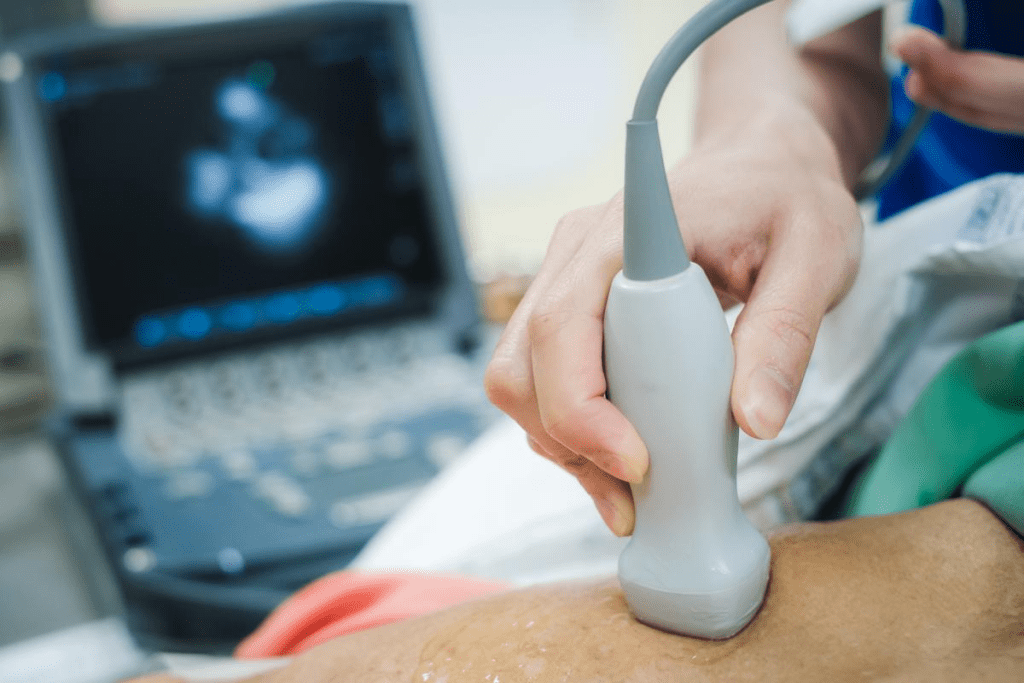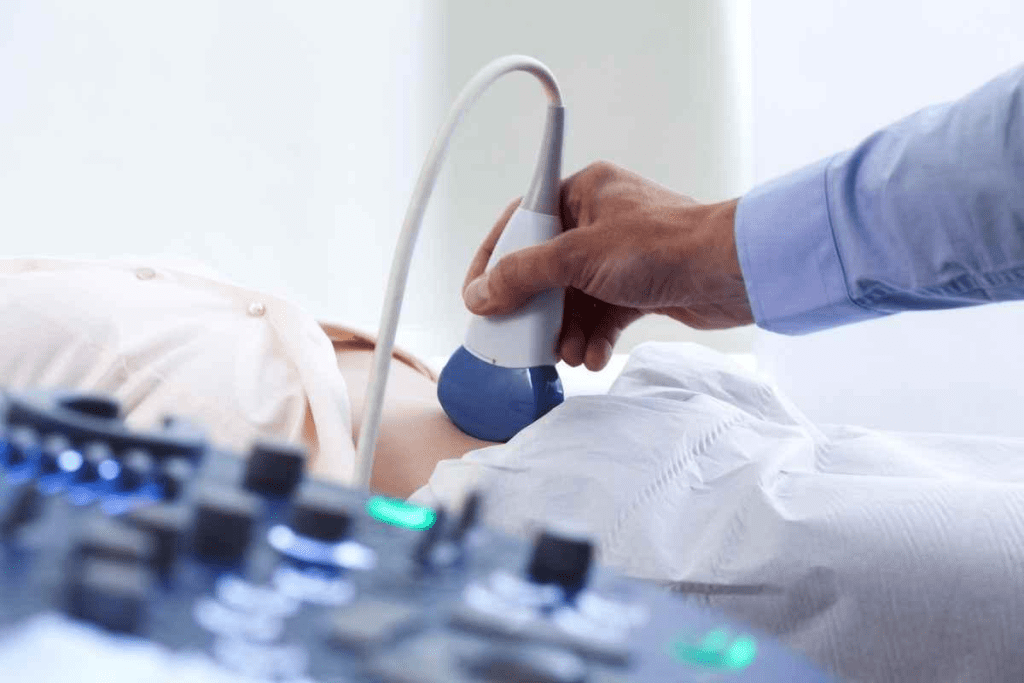Last Updated on November 25, 2025 by
Waiting for ultrasound results can be very stressful for patients. At Liv Hospital, we aim to give you quick and accurate results. We use the latest ultrasound machine and focus on you.
Usually, you’ll get your ultrasound results in 24 hours to 3 days. But, the time can change based on the ultrasound type and your situation.

It’s important to know what affects how fast you get your ultrasound results. We’ll look at these factors and how we’re trying to make things faster. This includes even when kub medical abbreviation is used. How long does it take to get the results of an ultrasound? Beyond the NPO medical abbreviation, learn the crucial, powerful facts on reporting time.
Knowing when you’ll get your ultrasound results is key. Usually, it takes 24 hours to 3 days. This time lets doctors carefully look at the images and give you a correct diagnosis.

This 24-hour to 3-day period is common. It lets radiologists study the ultrasound images, talk to other doctors if needed, and write a detailed report. For example, an abdominal ultrasound to check for gallstones on sonogram or to look at the liver, gallbladder, and kidneys usually takes this long.
At times, you might get your ultrasound results the same day. NHS England says about 95% of ultrasound reports are ready the same day. This is more common for simple cases or when using advanced tech like a bladder scanner.
But, some cases might need more time. This can be up to a week or more in rare cases. Reasons include needing more analysis, talking to specialists, or if the condition is complex, like needing a detailed KUB x-ray or abdominal sonar image.
Delays can be tough, but they’re often needed for accurate diagnoses and treatment plans. We aim to give you results quickly and accurately. We balance the need for detailed analysis with how urgent your situation is.
At Liv Hospital, we help our patients by explaining medical terms used in ultrasounds, starting with NPO. Knowing these terms can make your preparation and experience better.
NPO is short for “nil per os,” which means “nothing by mouth” in Latin. It’s often given to patients before certain ultrasounds, like those of the abdomen. Being NPO means you can’t eat or drink anything before your ultrasound. This is important because food and liquids can mess with the ultrasound waves.
To follow NPO instructions:
KUB stands for “kidneys, ureters, and bladder.” A KUB ultrasound looks at these areas. It’s used to find problems like kidney stones or blockages in the urinary tract.
Knowing what ultrasound you’re having can help you prepare. For example, a KUB ultrasound might need a full bladder for clearer images of the urinary tract.
There are many terms you might hear during your ultrasound. Getting to know them can make you feel less anxious and more ready to follow instructions.
Some important terms are:
By knowing these terms and following your doctor’s advice, you can have a better ultrasound experience. At Liv Hospital, we aim to give you the care and info you need during your tests.

The time it takes to get ultrasound results can change a lot. Waiting for them can be stressful. Many things affect how long it takes.
The type of ultrasound matters a lot. For example, an abdominal ultrasound usually takes less time than others. But, scans like a KUB x-ray might take longer because they need more detailed analysis.
How urgent your condition is also affects timing. If it’s very urgent, you’ll get your results faster. Less urgent cases might take longer.
Ultrasound images need a specialist to interpret them. If the images are simple, results come faster. But, complex images take longer to analyze.
How clear the images are is very important. Clear images help doctors diagnose faster. But, unclear images need more time. New tech, like portable ultrasound machines, helps make images better.
Knowing these factors helps you understand the process better. We aim to give you results quickly. But, your case’s specifics can influence the time it takes.
NHS England’s recent statistics show how fast ultrasound results are given. This gives us insights into how well diagnostics work. We look at how fast ultrasounds are compared to other tests.
About 95% of ultrasound reports are ready the same day, NHS England says. This shows how good modern ultrasound tech and healthcare experts are. High-frequency wands on ultrasound machines help get better images faster.
This fast reporting is thanks to the NHS’s efficient systems. It shows how ultrasound tech and healthcare teams work together. They aim to give patients results quickly.
Ultrasound results take zero days on average. This means patients usually get their results the same day. This is great for 8-week ultrasound pictures during pregnancy. It helps reduce worry and helps with prenatal care.
Ultrasound results are faster than many other tests. This is because ultrasounds are quick and safe. They don’t use harmful radiation, making them safe for patients.
Ultrasound imaging is safe and fast. It’s non-invasive and doesn’t use harmful radiation. This makes it a top choice for many medical tests.
At Liv Hospital, we’re using technology to cut down wait times for ultrasound results. We’re always looking for the latest in medical tech to improve care and make tests faster.
Digital appointment systems have changed the game for wait times. They’ve cut wait times by up to 75% or 90% in some cases. This tech helps us schedule better and get results to patients quicker.
Efficient scheduling and real-time updates are big pluses of digital systems. They help doctors manage their work better, speeding up when they can share results with patients.
Portable ultrasound machines have changed point-of-care testing. They let doctors do ultrasounds right at the bedside, saving patients from long trips to imaging labs. This makes patients happier and speeds up getting answers.
These machines are super helpful in emergencies or for patients who can’t move much. They bring the test to the patient, speeding up diagnosis and treatment.
New high-frequency wand technology has made ultrasound images much clearer. This means doctors can make more accurate diagnoses and often don’t need to do scans again.
With better images, doctors can diagnose and plan treatment faster. Clearer pictures help them make quicker, more accurate assessments, speeding up getting results to patients.
At Liv Hospital, we’re always looking for new tech to improve ultrasound diagnostics. By using digital systems, portable machines, and high-frequency wands, we’re giving patients faster, more accurate care.
Ultrasound technology is versatile, with different types serving unique diagnostic purposes. They have varying result timelines. We use various ultrasound types to diagnose and monitor a range of medical conditions, from abdominal issues to pregnancy complications.
Abdominal ultrasounds are commonly used to examine the health of abdominal organs. They help diagnose conditions such as gallbladder disease and liver disease. Results for abdominal ultrasounds are usually available within 24 to 48 hours.
This timeframe can vary depending on the complexity of the case and the need for specialist interpretation.
During pregnancy, ultrasounds play a key role in monitoring fetal development. An 8-week ultrasound can confirm pregnancy and determine gestational age. It can also check for any issues.
Results from pregnancy ultrasounds are often available quickly. Sometimes, patients can get their results within a few hours or by the next day.
Specialized ultrasound procedures, such as bladder scans, are used to assess specific medical conditions. A bladder scanner measures urine volume in the bladder. It is often used in urology and emergency medicine.
Results from these specialized ultrasounds are usually available immediately or within a few hours. This is because they are often performed at the point of care.
In conclusion, the timeline for receiving ultrasound results varies. It depends on the type of ultrasound, the clinical context, and the healthcare provider’s workflow. Understanding these differences can help patients better navigate their diagnostic journey.
Patients can take steps to get their ultrasound results sooner. We know how important it is to get medical info fast. We’re here to help in many ways.
Our patient portal is a great way to see your ultrasound results online. You can look at ultrasound images and reports whenever you want. This system keeps you updated on your health without needing a doctor’s visit.
To see your results online, just log in and go to the “Results” or “Medical Records” section. If you need help, our support team is ready to assist.
Talking directly to your doctor can also speed up getting your results. We suggest reaching out to your doctor or the radiology team to ask about your results. This can make things move faster.
When you call your doctor, have your patient ID and ultrasound date ready. This helps us find your records quickly.
Setting up a follow-up appointment can also help you get your results faster. At this meeting, you can talk about your results and what to do next.
We suggest making this appointment a few days after your ultrasound. This way, your results are fresh and relevant.
Using these methods”patient portals, direct contact, and follow-up visits”you can get your ultrasound results sooner. This keeps you involved in your health care.
Knowing what affects ultrasound result times can ease patient worries. At Liv Hospital, we offer top-notch healthcare and support. The type of ultrasound, like an abdominal scan, can change how soon you get your results.
How clear the ultrasound images are also matters a lot. Understanding medical terms, like KUB and NPO, helps patients know what to do. This knowledge helps them move through their care smoothly.
We work hard to give quick and correct results. We use the latest tech and talk clearly with our patients. Our goal is to help our patients through their health journey with clear expectations and care.
You usually get ultrasound results between 24 hours to 3 days. But, it depends on the ultrasound type and the situation.
Yes, you might get results the same day, mainly for urgent cases. Liv Hospital aims to give quick and accurate results. Sometimes, you can get them on the same day.
NPO means “nothing by mouth.” It’s a rule to follow before an ultrasound. It helps ensure clear images.
KUB stands for “kidneys, ureters, and bladder.” It’s an ultrasound for these areas. It helps find and track urinary tract issues.
Ultrasound types like abdominal and pregnancy ultrasounds have different timelines. The complexity and specialist review can affect how long it takes.
Yes, you can see your results online through patient portals. Liv Hospital offers this for easy access to your health info.
For quicker results, use patient portals, talk to your doctor, or plan follow-up visits.
High-frequency wand tech improves ultrasound images. It helps get clearer and more accurate results.
Yes, portable ultrasound machines are used more often. They’re flexible and can speed up getting results.
You might need to fast before an abdominal ultrasound. Your doctor will tell you how to prepare.
Yes, ultrasound can find gallstones. It’s a common tool for diagnosing abdominal issues.
At 8 weeks, you’ll see early signs of your baby’s growth. The ultrasound images give important pregnancy info and confirm your due date.
Tran, L. N. (2024). Urinary Incontinence. In StatPearls [Internet]. StatPearls Publishing. https://www.ncbi.nlm.nih.gov/books/NBK559095/
Subscribe to our e-newsletter to stay informed about the latest innovations in the world of health and exclusive offers!